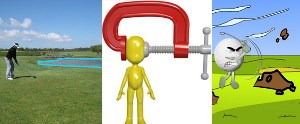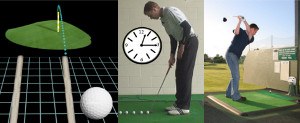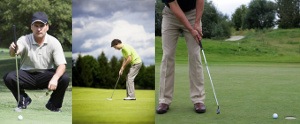If there is a common thread among amateur golfers, you could argue that it is a lack of confidence. The average amateur player simply does not believe in his or her ability to play this game successfully. While they love the game, the typical player doesn’t think much of their talent, or their prospects of shooting a low score in a given round. Unfortunately, this lack of belief is one of the biggest hurdles standing between amateur players and meaningful improvement on the links.

Of course, this lack of confidence is understandable. Golf is an extremely difficult game, and the average player doesn’t get out onto the course very often. If you play once per week as an amateur, you should consider yourself lucky – many players don’t even get to play once per month. Even if you figure something out during one round that you think can help you moving forward, you may forget all about it prior to your next round. Or, even if you do remember this new key you’ve discovered, it may not work the same way when you try it again, since you haven’t been able to practice it consistently. Simply put, it’s hard to get better at golf when you don’t spend time working on your skills each day.
To play good golf, you need to be confident. But how do you find that confidence? That’s where things get tricky – and that is the topic we hope to tackle in this article. Confidence is an extremely important piece of the overall golf puzzle, yet it’s not something you can practice in the traditional sense. For instance, if you are struggling with chip shots, you can work on your technique in order to improve. But how do you work on your confidence when it is a state of mind, rather than a physical technique? It’s not easy, to be sure, but we hope the content provided below will point you in the right direction.
| GOLF FIXES BY PGA PROS |
|---|
| The Confidence Factor | Video | Article |
| Top Tips To Make Bunker Shots Easier – Building Confidence | Video | Article |
| Building Confidence In Both The Driver And Putter | Video | Article |
| Lack Of Confidence Causes The Golf Shank | Video | Article |
| Swing With Confidence For Better Ball Striking | Video | Article |
| LESSONS |
|---|
| Element 4- Confidence In Their Golf Swings | Video | Article |
| Improve Confidence And Control Fear On The Golf Course | Video | Article |
| Ladies Hybrid Golf Clubs Used For Added Confidence | Video | Article |
| The Freedom Of Confidence When Swinging Not Lifting The Golf Club | Video | Article |
| Improve Your Confidence, to Create a Better Golf Game | Video | Article |
| Using A Game Plan To Build Golf Confidence | Video | Article |
| Need To Elevate Your Confidence Golf Tip | Video | Article |
| Building Confidence To Avoid Golf Topped Shots | Video | Article |
| Confidence Is Crucial For Better Golf Pitch Shots | Video | Article |
| Element 4- Confidence In Their Golf Swings | Video | Article |
| Having Confidence In Holding The Golf Swing Angle | Video | Article |
| Feeling The Confidence Flow From Your Feet To The Golf Swing | Video | Article |
| Stockton’s Golf Putting Routine Aims to Instill Confidence | Video | Article |
| Techniques to help golf chipping with confidence | Video | Article |
| How To Build A Wall Of Confidence On The Golf Course | Video | Article |
| The Confidence Club: Finding the Driver You Can’t Wait to Hit Again! | Video | Article |
| PRACTICE DRILLS |
|---|
| Golf Drill, 10 x 2 Footers Builds Confidence Putting | Video | Article |
| GOLF QUESTIONS |
|---|
| Golf Confidence, How Can I Get More In My Game? | Video | Article |
| Do Senior Hybrid Golf Clubs Help With Your Confidence? | Video | Article |
| How Can Dave Stocktons Golf Putting Routine Improve My Confidence | Video | Article |
| How Does The Design Of A Hybrid Golf Club Inspire More Confidence | Video | Article |
Before we even get into the issue of improving your confidence, we’ll first talk about why it is important for every golfer to believe in his or her abilities. From there, we’ll get into some methods that can be used to grow your confidence during practice, so you will feel better prepared to step out onto the course. Also, later in the article, we are going to talk about how confidence applies specifically to the short game. Putting and chipping tend to bring out a player’s doubts more than any other part of the game, so you need to be mentally strong when close to the hole.
All of the content below has been written from the perspective of a right-handed golfer. If you happen to play left-handed, please take a moment to reverse the directions as necessary.
— The Value of Confidence
It’s easy to understand the importance of a quality golf swing. If you have good technique, it will be easier to hit the ball in the right direction – and hit it with authority. Most golfers spend the majority of their practice time paying attention to things like mechanics and tempo, since those are directly associated with hitting good shots.
We aren’t using this article to tell you that those things aren’t important – they are. At the same time, it’s also important to be as confidence as possible when you step onto the first tee. If you are filled with doubt as to your ability to hit good shots once on the course, even the best technique in the world isn’t going to do you any good.
Let’s take a look at a few points that highlight the importance of confidence in golf.

- Golf courses have lots of hazards! If you are even slightly experienced in this game, you already know that there are plenty of nasty places lurking on most courses as you make your way from the first tee to the last green. Whether it is a water hazard, a deep bunker, some out of bounds stakes, or anything else, there are a lot of places you don’t want your ball to end up. Sure, there is a fairway out there somewhere, but it often seems like all you can see are the hazards when looking down the hole. If you lack confidence in your abilities, those hazards are going to get in your head and make it hard to execute your technique properly. Confidence wouldn’t be quite so important if this game was just played out on an open field, but that’s not the way the game works. To be ready for the challenge that lays ahead during a 9- or 18-hole round, you’ll want to bring as much confidence as you can carry.
- Pressure is a factor. In addition to the hazards that you are going to face, you’ll also have to deal with pressure from time to time on the links. This is an issue that many golfers think doesn’t affect them if they don’t play in tournaments or club events. Simply put, that isn’t true – pressure effects every golfer, at least to some degree. You can deal with pressure even if you are playing a round of golf all by yourself, with no one else anywhere in sight. How does that happen? As a golfer, you almost certainly care about the outcome of your shots, and the score you write down on your card at the end of the day. Even if no one else will ever see that score, you want to make it as low as possible. So, for instance, if you get toward the end of a round with a chance to shoot a great score – maybe even your best score ever – you will feel nervous and pressure will be a factor. Players with sufficient confidence in their abilities will be better able to withstand this pressure.
- Things will go wrong. If you didn’t know it already, golf is one of the hardest games in the world. Some people underestimate the difficulty of the game because from the outside, it just looks like men and women walking around a field in nice clothes. Once you try it for yourself, however, it becomes clear that playing this game well is an extreme challenge. And, with such a challenge is sure to come some failure. Even the best in the world hit bad shots, so the average golfer is sure to make some poor swings in each and every round. How you respond to a few bad shots is largely going to be determined by your level of confidence. If you feel confident in your game and trust the mechanics of your swing, you’ll be able to chalk up some poor shots to nothing more than the difficulty of this game. You will keep your mind on track and be unaffected by those mistakes. On the other hand, if you have low confidence, even just a couple of bad shots may leave you questioning everything that you are doing on the course. You’ll start to make changes on the fly, and your results will quickly deteriorate as a result.
It’s safe to say that confidence in golf is essential to consistent performance. Even if you don’t have any PGA Tour dreams, you’ll still want to be as confident as possible to improve your level of play and have more fun at the same time. We hope the content that makes up the rest of this article will help you add to your confidence in the near future.
— Building Confidence in Practice
The ultimate goal here is to be confident enough to head out onto the golf course with an expectation of good performance. That’s the goal, but that is not where you are likely to start. At this point, you might not have much belief in your game, and as a result, you struggle to produce many good shots on the course. Even if you swing the club pretty well on the practice range, it might be hard – or nearly impossible – to get those kinds of results when it’s game time.
To start moving your confidence in the right direction, you will need to practice in a way that promotes the development of belief in your skills. There are a variety of ways to do this, and we have listed a few below for your consideration.

- Be specific with your targets. Golf is a target game. With each shot, you are trying to hit a target. It might be the fairway, the green, or the hole – but you should always have a target in mind. On the range, many golfers fail to pick out targets, and instead they just swing away. After all, there is plenty of room down the range, so it almost doesn’t feel necessary to bother selecting a specific target. As you might imagine, this practice habit is not going to do you any favors. For each shot you hit during practice – with the possible exception of a few casual warm-up swings – you should have a very specific target in mind. After you make the swing and send the ball on its way, evaluate your performance in terms of how close you got to the target. Did you nearly knock the flag over, or were you way off? This form of practice will help to build confidence because you will see that some of your shots are successful. Sure, there will be bad ones along the way, but some of the shots are going to head toward the target. That means you can expect some of your shots on the course to do the same thing. As you continue to practice, you should find yourself hitting the target more and more frequently, and your belief in yourself will continue to grow.
- Practice consistently. This is a big one. Simply put, it’s hard to believe in your abilities as a golfer if you rarely get to swing your clubs. How could you be expected to have confidence if you go months in between visits to the range or course? It’s just not going to happen. To build confidence, you have to be consistent with your efforts. With that said, being ‘consistent’ is not the same thing as getting to the range every day for practice. This is the real world, and unless you are a professional golfer, you probably don’t have the time for daily range work. Even if you can get to the range just once a week, and maybe get out to play twice a month, that will be enough to build some confidence. In addition to those visits to the range, dry adding in some practice swings in your yard (without a ball) on the off days. Just putting a club in your hands as often as possible is going to be a big help in the pursuit of belief.
- Add variety. It’s easy to fall into the trap of just hitting the same shots over and over again on the practice range. You might think that you aren’t good enough to actually vary the types of shots you hit, so you may just keep pounding away at your ‘standard’ swing, trying to improve your consistency. There is something to be said for that kind of repetition, but most golfers would benefit from trying to mix it up. If you typically hit a fade, try to produce a draw from time to time on the range. Even if those efforts don’t work out at first, you’ll expand your horizons and learn how to feel different things in your swing. You may be surprised to find how much confidence you can gain simply from experimenting with new kinds of swings and ball flights during practice. When you go back to your stock swing and the ball flight you are familiar with, you may have more confidence than before.
Tailoring your practice toward the goal of building confidence is going to help you almost immediately on the course. You will still be aware of your limitations, of course, but you should feel like the work you’ve done on the range has a real chance to impact your scores in a positive manner.
— Taking Your New Confidence onto the Course
All golfers know the struggle of taking their ‘range game’ out to the course. Usually, players think of this issue from a physical perspective – it just doesn’t seem like they are able to use the same swing technique on the course as they use on the range. That can be a problem, but an inability to bring your confidence with you onto the course is just as much of an issue.
As you start to feel good about your game on the range, you’ll reach a point where you need to make a tee time and go test things out on the course. You may be filled with optimism thanks to your newfound confidence, but there is also going to be a bit of doubt rolling around in the back of your mind. What if things aren’t any better than the last time you played? These doubts are natural, and the only way to confront this issue is head-on. Make that tee time, step up to the first hole feeling good about yourself, and keep the tips below in mind as you play.

- More than score. At first, success in this pursuit is not going to be measured on the scorecard. Rather, you are going to look at success in terms of how you think and feel during your round. Do you expect to hit good shots when you stand over the ball, or are you worried about all the various ways each shot could go wrong? Be honest with yourself and evaluate your level of confidence as the round transpires. Most likely, your attitude will go up and down a bit throughout the day. You’ll want to see lower scores eventually, of course, but for now be happy just to focus on how you feel and what your perspective is like while on the course.
- Play an easy course. This might seem like a bit of a cop-out, but it’s really just a good strategy to get yourself moving in the right direction. Working on your confidence on the range for a couple of weeks, only to then make a tee time at the hardest course in town, would be a mistake. There is no reason to expose yourself to such a stiff test right off the bat. Select a course with a relatively modest difficult rating and make things easy on yourself at first. This will allow you to focus your attention inwardly, rather than being concerned about what hazards and other obstacles are waiting. There will be time later to play those hard courses once your confidence is firmly established.
- Play alone. When playing golf with other people, there is a natural tendency to want to impress your playing partners. Even if you aren’t competing, you’ll want to play your best and hit as many good shots as possible. That’s great – but it’s not necessarily the best situation when you are trying to solidify your on-course confidence. Playing in front of others tends to make some golfers nervous and self-conscious. If that sounds like you, try to book a tee time when the course is quiet, and you’ll be able to play alone. In that setting, you can make it about nothing more than you vs. the course. It’s easier to focus without others to chat with, compete against, etc. Just as with the idea of playing an easy course, this method will give you a soft landing. You can gradually work your way back into playing with other golfers once you feel better and your game and your mindset.
Nothing comes easy in golf, and that includes improved confidence. You are going to have to work for a higher confidence level, and there are likely to be setbacks along the way. Stick with it, be as positive as you can, and look forward to the day when you have supreme belief in what you can do on the links.
— Confidence in the Short Game
The short game is where mental demons can really come out to play on the course. If you think it’s hard to maintain your confidence while standing over a tee shot, try digging up some belief in yourself while facing a tricky downhill three-footer under pressure. Everything about the short game feels so final – if you miss a putt, there is no way to get that stroke back. It’s often possible to hit a good recovery shot from a poor drive, but you can’t recover from an errant short putt. You just tap the next one in and accept your score for what it is.
With so much pressure possible on and around the greens, it’s no surprise that so many players struggle with confidence in this area. If your level of belief is lowest with a putter or wedge in your hand, we hope the tips below will help.

- Nobody is perfect. One of the best things you can do for your mindset in the short game is to accept that some of your shots are going to miss. That might sound like a negative mindset, but really, it’s just realistic. Nobody is perfect in golf – not even the pros. You want to give each shot your best effort, of course, but do so knowing that some of them aren’t going to work out. This thinking should relax your attitude and free you up to perform at your best level.
- See success in practice. Don’t always seek out the toughest part of the practice green in order to work on your putting. Instead, find a flat spot where you can knock in a bunch of three-footers in a row. Seeing the ball go in the hole over and over again can do wonders for your confidence. The same concept holds true for chipping – pick out a relatively easy chip shot and knock the ball up close to the hole over and over. You will naturally begin to think more optimistically about your short game skills.
- Add some pressure. Feeling a bit of pressure on the course is natural when facing short game shots, but you might not feel any pressure at all during practice. That’s a problem, because you want your practice to be as similar as possible to your on-course experience. The solution is to build some pressure into your practice environment. Try practicing with a friend so you can have a competition by playing a few putting or chipping games. This will make you focus and help you learn how to perform when the heat is on.
Will this article be all you need to start believing in yourself on the golf course? No – probably not. It’s not easy to build confidence in such a challenging game, so be patient and try to take small steps toward a more confident mindset. It’s important to understand that this is not going to be a ‘light switch’ type of event, where one moment you aren’t confident and the next moment you are. Rather, it will be gradual, with you finding that you have more and more belief in your abilities as time goes by. Thanks for reading and good luck!






